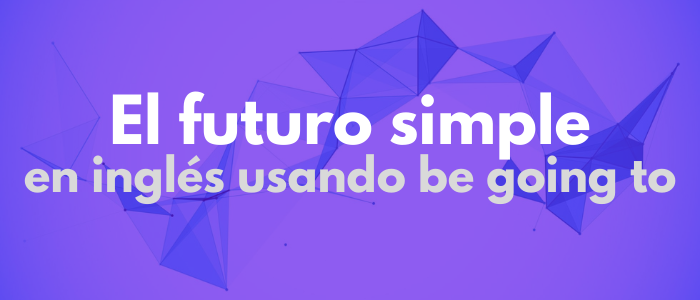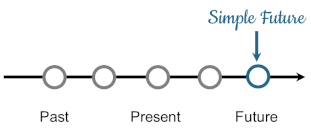Category: Tiempos verbales
La segunda forma de expresar el futuro, además de usar el auxiliar will, es usando be going to.
Usos del futuro simple con "be going to"
To talk about future plans or intentions decided before the moment of speaking
Hablar sobre planes o intenciones futuras decididas antes del momento de hablar
Hablar sobre planes o intenciones futuras decididas antes del momento de hablar
- I'm going to spend my vacation in London next spring - Voy a pasar mis vacaciones en Londres la próxima primavera.
- She is going to buy a new dress for the party - Ella se va a comprar un vestido nuevo para la fiesta.
To make predictions based on present evidence (something we can see or hear)
Hacer predicciones basadas en la evidencia actual (algo que podemos ver o escuchar)
Hacer predicciones basadas en la evidencia actual (algo que podemos ver o escuchar)
- Look at those dark clouds, it's going to rain later - Mira esas nubes oscuras, va a llover más tarde.
- Those kids shouldn’t play with fire. They are going to hurt themselves - Esos niños no deberían jugar con fuego. Se van a lastimar.
Forma
Afirmativa: SUJETO + TO BE + GOING TO + VERBO
Ejemplos:
- I'm going to work in a hospital when I leave school - Voy a trabajar en un hospital cuando salga de la escuela.
- He is going to arrive late - Él va a llegar tarde.
- She's going to look for a new place to live next month - Ella va a buscar un nuevo lugar para vivir el próximo mes.
- It's going to be difficult to get a job during the pandemic - Va a ser difícil conseguir un trabajo durante la pandemia.
- We are going to learn English - Vamos a aprender inglés.
- They're going to sell clothes - Ellas van a vender ropa.
- You are going to play as goalkeeper on Saturday - Vas a jugar de portero el sábado.
Negativa: SUJETO + TO BE + NOT + GOING TO + VERBO
Ejemplos:
- I'm not going to swim at the beach. I feel sick. - No voy a nadar en la playa. Me siento enferma.
- Mrs. Lee is not going to cook rice tonight - La Sra. Lee no va a cocinar arroz esta noche.
- We are not going to do exercise. We are tired - No vamos a hacer ejercicio. Estamos cansados.
- I think they're not going to travel to Miami tomorrow - Creo que ellos no van a viajar a Miami mañana.
Interrogativa: TO BE + SUJETO + GOING TO + VERBO
Ejemplos:
- Is she going to play volleyball after school? -Yes, she is/No, she is not. - ¿Va ella a jugar voleibol después de la escuela? -Si, yo si va/No, no va.
- Aren't they going to come to the party? - Yes, they are/No, they aren't - ¿No van a venir a la fiesta? Si, si van/No, no van.
Puede agregar una palabra de pregunta (what, where, when, why, who, how, etc.) antes del verbo to be para solicitar más información.
Ejemplos:
Ejemplos:
- What am I going to tell them? - ¿Qué les voy a decir?
- Where is she going? - ¿A dónde va?
- Who are you going to invite to the party? - ¿A quién vas a invitar a la fiesta?
- When are they going to marry each other? - ¿Cuando se van a casar?
- Why is he going to be late? - ¿Por qué va a llegar tarde?



